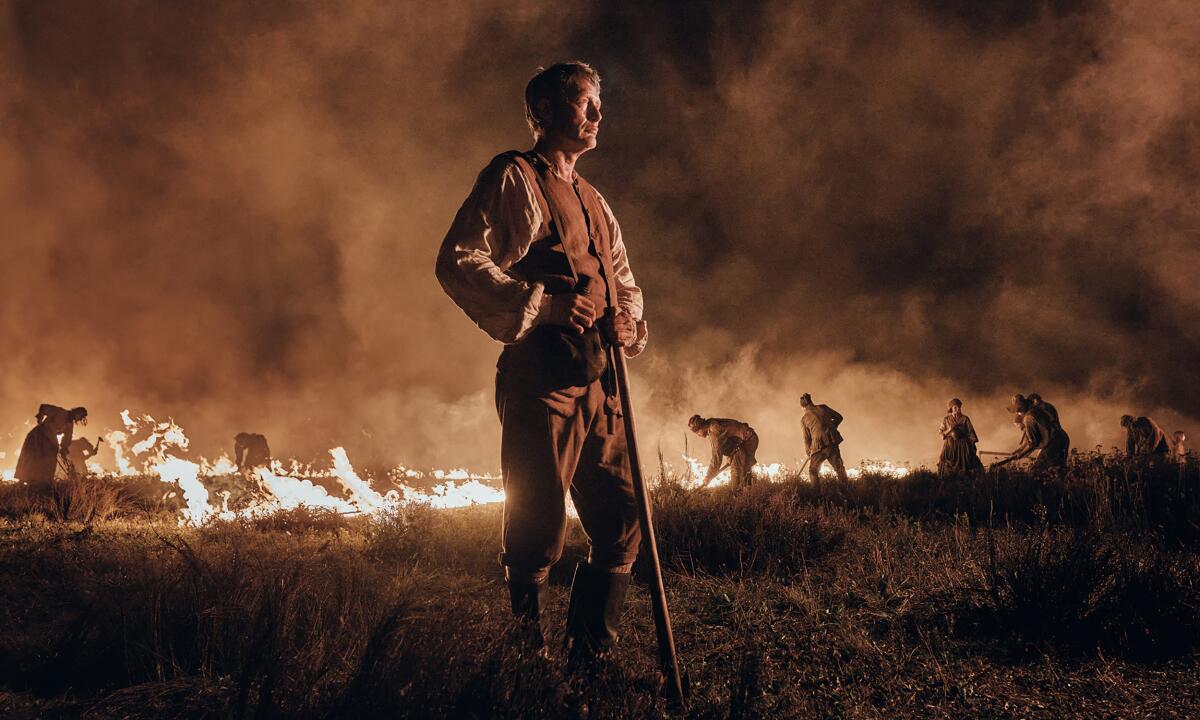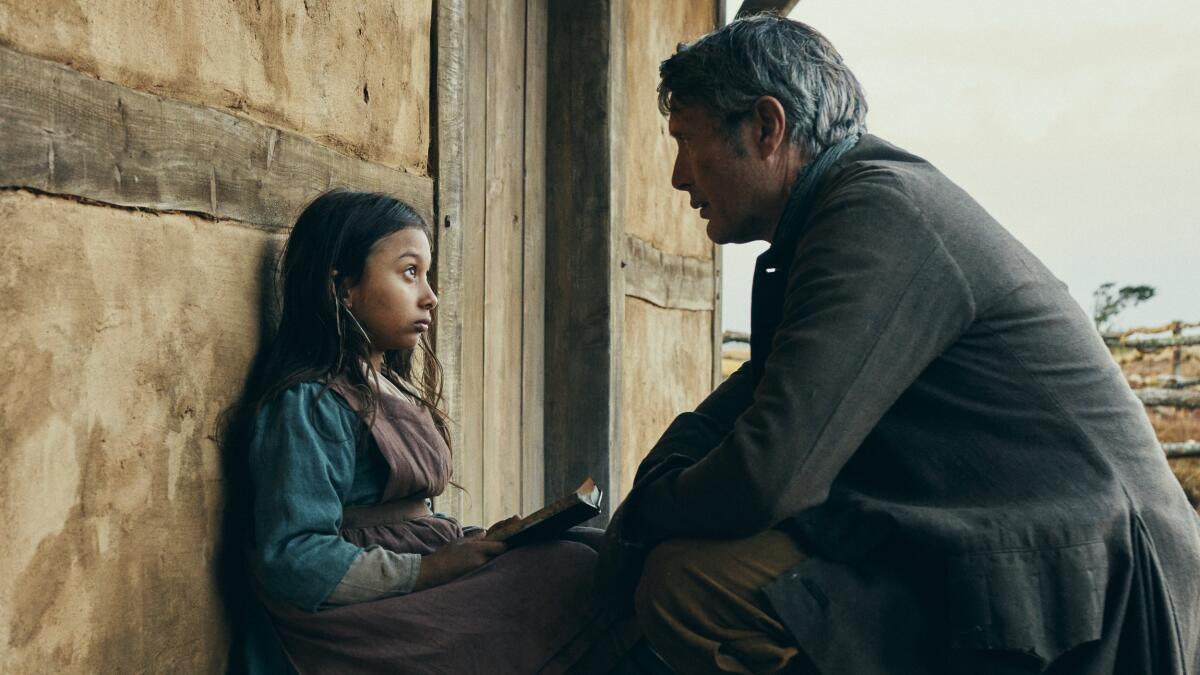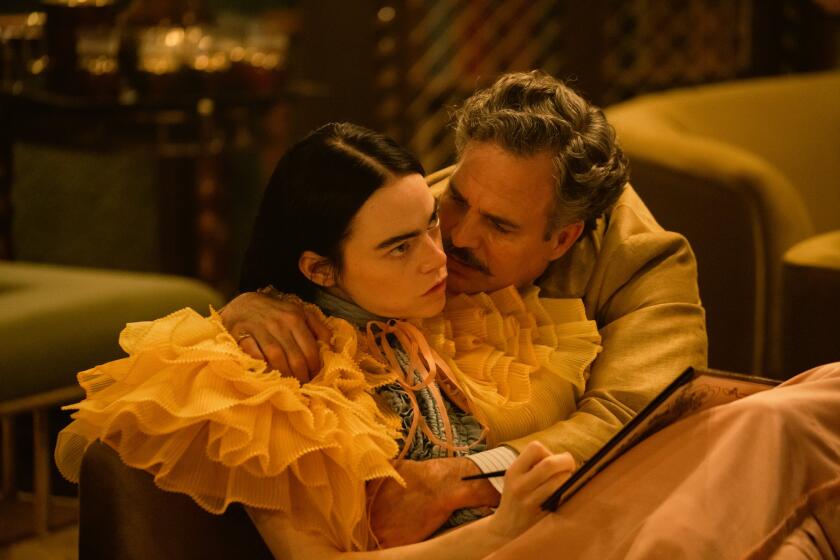Review: In Denmark’s ‘The Promised Land,’ the virtues of an old-school western still blaze

- Share via
Nikolaj Arcel’s “The Promised Land” is aptly titled. Adapted from the 2020 novel “The Captain and Ann Barbara,” by Ida Jessen, the land itself — the untamed heath of Jutland, the peninsula that makes up the continental portion of Denmark — proves to be both setting and character: as mercurial, tormented and blood-stained as anyone in this tale.
In 1755, the heath is empty, save for bands of outlaws and low-lying foliage, until a retired army captain, Ludvig Kahlen (Mads Mikkelsen) leaves the poor house with a secret shipment from Germany and a plan. He convinces the Royal Treasury to let him cultivate the territory at his own expense, appeasing the whims of King Frederick V and earning himself a noble title in exchange.
Ultimately, Ludvig’s is the story of a homesteader, and Arcel treats it with the iconography and grandeur of a classic western, Scandinavian style. The film is a tapestry of misty vistas pierced only by lantern light as Ludvig battles the unforgiving earth in every condition, day and night, the planes of Mikkelsen’s distinctive face set against the sky.
If only the soil were his only antagonist. Ludvig has planted his settlement on a stretch of acreage that a nearby landowner and local judge, Frederik de Schinkel (Simon Bennebjerg), fancies his own. The only laborers Ludvig manages to keep are a couple of runaway tenant farmers, Johannes (Morten Hee Andersen) and Ann Barbara (Amanda Collin), whom Frederik also fancies his own. And Frederik is a jealous, controlling and vengeful megalomaniac, who sets about destroying Ludvig’s dreams at any cost, simply because of where they are on the map.

After a foray into Hollywood with the 2017 Stephen King adaptation “The Dark Tower,” writer-director Arcel is back in his wheelhouse of Danish historical dramas, reuniting with Mikkelsen, who starred in his 2012 film “A Royal Affair,” and with his co-writer Anders Thomas Jensen, with whom he wrote “Riders of Justice.” Arcel’s films don’t revise Danish history so much as expand upon it, upturning previously held assumptions and examining the corruption of powerful men, with a socially progressive, even feminist bent.
Arcel makes this kind of large-scale period filmmaking look effortless, these detailed dramas of serious emotion and sociopolitical issues woven with humor, romance and sensuality. He approaches aristocracy with a certain level of absurdism, showing men in power as ridiculous and pathetic. Bennebjerg takes well to this, playing the psychopathic sadist Frederik in an almost comedic vein.
We laugh at him, especially when he continually corrects everyone to include the “de” in his last name, added as a vanity to seem more aristocratic. But we also see Frederik’s enormous cruelty, as he lashes out in a murderous rage whenever he feels impotent or frustrated, taking it out on innocents. Frederik is a very bad man, and witnessing what he has coming to him is deeply satisfying, the lines of good and evil clearly drawn as they usually are in this kind of throwback storytelling.
Critic Justin Chang and columnist Glenn Whipp weigh in with their favorite (and least favorite) films at the festival’s robustly packed 50th-anniversary edition.
“The Promised Land” is also the story of an unlikely family, a slowly developing theme that reveals itself over the course of the film’s runtime. It is a found family, made up of Ludvig, the steely Ann Barbara and a young Romani girl, Anmai Mus (Melina Hagberg), whose mischief and humor bring a lightness to the remote house on the heath. However, she is the focus of racism and discrimination by the German settlers who arrive there, and Ludvig almost loses the women who, though not a part of his plan, make his life complete.
This is the finest work of Arcel’s collaboration with longtime cinematographer Rasmus Videbæk. They craft this Nordic western epic with an eerie beauty and an eye toward the kind of startling violence that can erupt unexpectedly in lawless frontiers. Blood flows darkly and scenes are lighted by flame: a raging fire on the field as Ludvig and his outlaw workers burn the heather, blazing candelabras illuminating an intimidating manor dinner, feeble lamplight beating back the foggy night as Ludvig battles the dirt with his bare hands. Aerial shots capture the texture and topography of the landscape.
Mikkelsen commands quiet attention with his signature stoicism at the center. His Ludvig is orbited by the flamboyantly evil Frederik, the wounded yet powerful Ann Barbara and the charmingly potty-mouthed Anmai Mus. But Mikkelsen has a stunning ability to express deep wells of emotion with only his eyes; much is communicated in glances and meaningful looks. Without a single word, he makes his final decision about his land and his fate upon it, though his feelings couldn’t be more clear.
“The Promised Land” is the kind of sweeping big-screen epic that will make you say, “They don’t make them like this anymore.” Thank goodness Nikolaj Arcel still does.
Katie Walsh is a Tribune News Service film critic.
'The Promised Land'
In Danish, Swedish, German and Norwegian, with English subtitles
Rating: R, for bloody violence, language, some sexuality and brief nudity
Running time: 2 hours, 7 minutes
Playing: In limited release Friday, Feb. 2
More to Read
Only good movies
Get the Indie Focus newsletter, Mark Olsen's weekly guide to the world of cinema.
You may occasionally receive promotional content from the Los Angeles Times.











